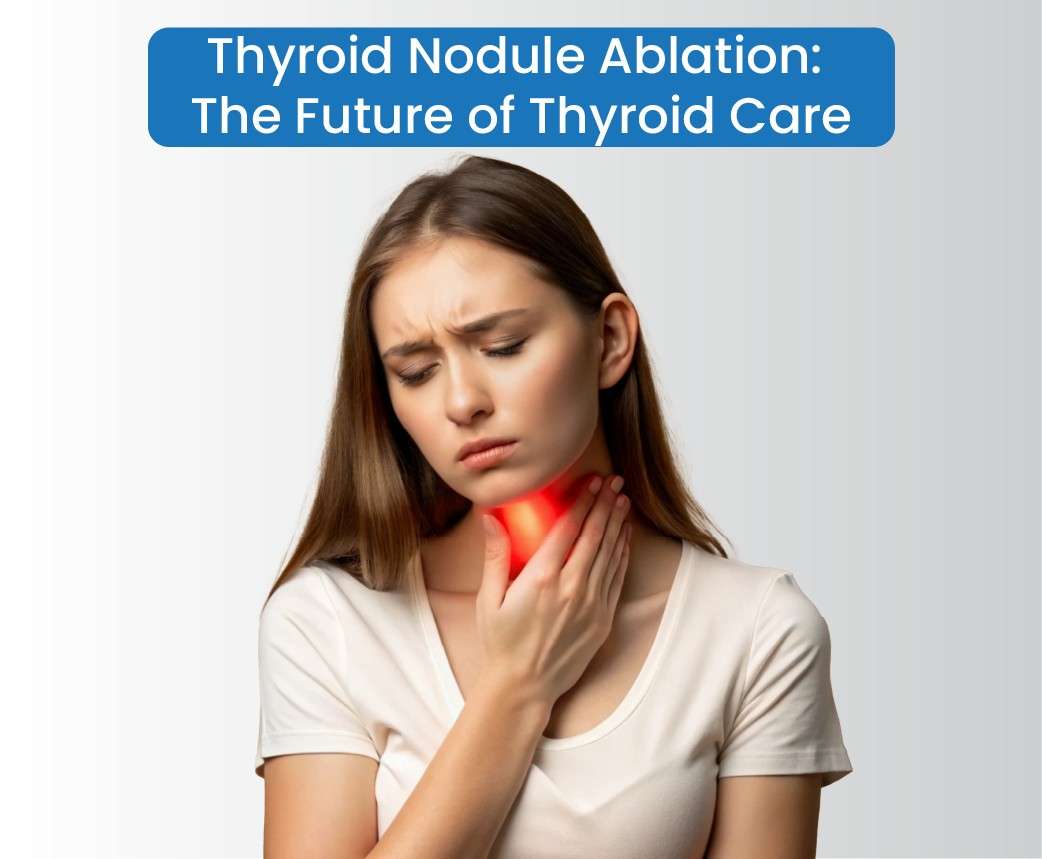Shifting Paradigms in Thyroid Treatment
The landscape of thyroid treatment has undergone a remarkable transformation in recent years, marked by a discernible shift away from traditional surgical interventions towards minimally invasive procedures. Among these advancements, radiofrequency ablation (RFA) has emerged as a promising alternative for addressing thyroid nodules and small thyroid cancers. In this comprehensive exploration, we explain the rationale behind this transition, the intricacies of radiofrequency ablation, and the array of benefits it offers to patients.
Understanding the Evolution
For decades, surgical removal of the thyroid gland, known as thyroidectomy, stood as the cornerstone of treatment for various thyroid disorders, including nodules and cancers. While effective, thyroidectomy entails inherent risks, including damage to adjacent structures, postoperative complications, and the need for lifelong thyroid hormone replacement therapy. As a result, healthcare providers have increasingly sought less invasive alternatives that prioritize patient safety, minimize morbidity, and optimize outcomes.
Radiofrequency Ablation: A Minimally Invasive Marvel
Radiofrequency ablation represents a significant breakthrough in the realm of thyroid care, offering a targeted, non-surgical approach to managing thyroid nodules and select thyroid cancers. The procedure involves the precise delivery of thermal energy to the targeted tissue, achieved through the insertion of a specialized needle guided by ultrasound imaging. This energy heats and destroys the abnormal thyroid tissue while sparing the surrounding healthy tissue, thereby preserving thyroid function and minimizing the risk of complications.
Unveiling the Benefits
The adoption of radiofrequency ablation as a preferred treatment modality is underscored by a myriad of advantages that it confers upon patients:
- Preservation of Thyroid Function: Unlike thyroidectomy, which often necessitates the removal of a portion or the entirety of the thyroid gland, RFA selectively ablates the pathological tissue while preserving the functional integrity of the thyroid. This preservation of thyroid function mitigates the risk of hypothyroidism and obviates the need for lifelong hormone replacement therapy.
- Minimized Morbidity and Complications: By virtue of its minimally invasive nature, RFA mitigates the risk of surgical complications such as wound infection, bleeding, and injury to surrounding structures like the recurrent laryngeal nerve and parathyroid glands. This translates into reduced postoperative pain, shorter hospital stays, and expedited recovery times for patients.
- Enhanced Cosmetic Outcomes: The small incisions required for RFA result in minimal scarring and cosmetic disfigurement compared to the more extensive incisions associated with thyroidectomy. This aesthetic advantage is particularly relevant for patients who prioritize cosmetic outcomes and wish to minimize visible surgical scars.
- Outpatient Procedure: Radiofrequency ablation is typically performed on an outpatient basis, allowing patients to return home on the same day of the procedure. This eliminates the need for hospitalization and reduces healthcare costs associated with prolonged hospital stays, making RFA an economically viable treatment option.
- High Efficacy and Safety Profile: Extensive clinical research has demonstrated the efficacy and safety of RFA in reducing the size of benign thyroid nodules and achieving complete remission of select thyroid cancers. The procedure boasts high success rates, with minimal risk of recurrence or adverse effects.
Embracing a Paradigm Shift
The integration of radiofrequency ablation into the thyroid treatment modalities represents a paradigm shift in the approach to thyroid care. With its ability to provide effective, minimally invasive solutions for thyroid nodules, RFA empowers patients and healthcare providers alike to navigate the complexities of thyroid disease with confidence and optimism.
As the field of thyroidology continues to evolve, driven by innovation and technological advancements, the prominence of minimally invasive approaches like RFA is poised to expand. By embracing these transformative modalities, healthcare providers can usher in a new era of thyroid care characterized by improved patient outcomes, enhanced quality of life, and a renewed commitment to patient-centered care.
Choose Ablation for Thyroid No Scars No Surgery
Thyroid disorders, including thyroid nodules, can significantly impact one’s health and quality of life. While surgical removal of the thyroid has been a traditional approach to managing thyroid nodules, advancements in medical technology have introduced a less invasive and equally effective alternative: ablation therapy. In this blog, we will explore the benefits of ablation over thyroid removal, highlighting why patients should consider this innovative treatment approach for thyroid disorders.
Understanding Thyroid Nodules: Thyroid nodules are common, often benign growths that develop within the thyroid gland. While many nodules are harmless and require no treatment, some can cause symptoms such as difficulty swallowing, neck discomfort, or changes in voice tone. In some cases, thyroid nodules may be associated with thyroid dysfunction or even thyroid cancer, necessitating further evaluation and treatment.
Complications of Thyroid Nodules: Left untreated, thyroid nodules can lead to various complications, including:
- Thyroid Dysfunction: Some nodules may disrupt the normal production of thyroid hormones, leading to symptoms of hypothyroidism (underactive thyroid) or hyperthyroidism (overactive thyroid).
- Compression Symptoms: Larger nodules can compress nearby structures in the neck, causing difficulty swallowing, breathing, or speaking.
- Cosmetic Concerns: Nodules located near the surface of the neck may be visible or palpable, causing cosmetic concerns for some patients.
- Risk of Thyroid Cancer: While most thyroid nodules are benign, a small percentage may harbor thyroid cancer, necessitating further evaluation and treatment.
Challenges of Thyroid Removal:
Historically, surgical removal of the thyroid, known as thyroidectomy, has been the primary treatment for thyroid nodules, especially those suspected to be cancerous. However, thyroidectomy comes with several challenges and potential complications, including:
- Risk of Complications: Thyroidectomy is a major surgical procedure that carries inherent risks, including bleeding, infection, damage to surrounding structures (such as the parathyroid glands or recurrent laryngeal nerves), and scarring.
- Extended Recovery Time: Recovery from thyroidectomy may require several weeks, during which patients may experience pain, discomfort, and limitations on daily activities.
- Hormone Replacement Therapy: Complete removal of the thyroid gland necessitates lifelong hormone replacement therapy to maintain thyroid hormone levels, leading to ongoing medication management and potential side effects.
- Cosmetic Considerations: Thyroidectomy leaves a visible scar on the neck, which may cause distress for some patients, particularly if the scar is prominent or keloid-prone.
Advantages of Ablation Therapy: Ablation therapy offers a less invasive and highly effective alternative to thyroidectomy for the treatment of thyroid nodules. Here are some key benefits of ablation:
- Minimally Invasive: Ablation procedures, such as radiofrequency ablation (RFA) or laser ablation, are performed using needle-like probes inserted directly into the thyroid nodule under ultrasound guidance. This minimally invasive approach reduces the risk of complications and shortens recovery time compared to surgery.
- Preservation of Healthy Thyroid Tissue: Unlike thyroidectomy, which involves removing the entire thyroid gland, ablation therapy selectively targets and destroys only the problematic nodule while preserving surrounding healthy thyroid tissue. This helps maintain normal thyroid function and eliminates the need for lifelong hormone replacement therapy.
- Outpatient Procedure: Ablation procedures are typically performed on an outpatient basis, allowing patients to return home the same day and resume normal activities shortly thereafter. The procedure itself is relatively quick, with minimal discomfort and downtime.
- High Success Rates: Ablation therapy has been shown to be highly effective in reducing the size of thyroid nodules, alleviating symptoms, and improving overall quality of life for patients. Studies have demonstrated excellent long-term outcomes with low rates of recurrence.
To conclude, Thyroid nodules can pose significant challenges and complications for patients, but advancements in medical technology have introduced a safer, less invasive alternative to surgical removal: ablation therapy. By selectively targeting and destroying problematic nodules while preserving healthy thyroid tissue, ablation offers patients a highly effective treatment option with minimal risk and rapid recovery.
If you’re facing the dilemma of thyroid nodule management, consider discussing ablation therapy with your healthcare provider to explore the best treatment approach for your individual needs.
Thyroid nodules, should you worry?
Thyroid nodules are lumps or growths within the thyroid gland, which is located at the base of the neck. While most thyroid nodules are benign (non-cancerous), they can sometimes lead to complications, depending on their size, the underlying cause, and whether they produce thyroid hormones.
The likelihood of a thyroid nodule disappearing on its own depends on several factors, including its type, size, and underlying cause. Here’s a general overview:
- Cystic Nodules: These are filled with fluid and are more likely to resolve without treatment. Some cystic nodules may require drainage but can then resolve.
- Inflammatory Nodules: Caused by thyroiditis (inflammation of the thyroid), these nodules may decrease in size or resolve as the inflammation subsides.
- Small, Benign Nodules: Smaller nodules, especially those less than 1 cm in size, may not require treatment and could remain stable or decrease in size over time.
Complications of Thyroid Nodules
Goiter: Large nodules or multiple nodules can lead to the enlargement of the thyroid gland, known as goiter. This can cause cosmetic concerns and also potentially compress nearby structures in the neck, leading to symptoms like difficulty swallowing, coughing, or breathing difficulties.
Hyperthyroidism: Some nodules produce excess thyroid hormones, leading to hyperthyroidism. Symptoms of hyperthyroidism include weight loss, rapid heartbeat, sweating, nervousness, and irritability.
Hypothyroidism: In some cases, nodules can interfere with thyroid function, leading to hypothyroidism, where the gland underproduces hormones. Symptoms include fatigue, weight gain, cold intolerance, and depression.
Thyroid Cancer: A small percentage of thyroid nodules are malignant. Thyroid cancer is generally treatable, but it requires prompt diagnosis and treatment.
Bleeding and Pain: Rarely, a nodule may bleed or cause pain.
Cosmetic and Psychological Impact: Visible nodules or those causing a noticeable goiter can affect a person’s appearance and self-esteem.
New Ablation Treatment for Thyroid Nodules
In recent years, minimally invasive procedures for treating thyroid nodules have been developed, including various forms of ablation therapy. These techniques are particularly valuable for patients who are not ideal candidates for surgery or who prefer a less invasive approach.
- Radiofrequency Ablation (RFA): This technique uses radiofrequency energy to heat and destroy abnormal thyroid tissue. A small needle electrode is inserted into the nodule under ultrasound guidance, and radiofrequency energy is then applied to heat and destroy the targeted cells. RFA is mainly used for benign nodules and nodules causing hyperthyroidism.
- Laser Ablation: Similar to RFA, laser ablation involves using laser energy to heat and destroy nodule tissue. A laser fiber is inserted into the nodule, and the emitted laser energy causes thermal damage to the nodule cells.
- Ethanol Ablation: This procedure involves injecting alcohol (ethanol) into the thyroid nodule under ultrasound guidance. The ethanol causes the nodule cells to dehydrate and die. Ethanol ablation is particularly effective for cystic thyroid nodules.
These ablation techniques offer several benefits:
- Minimally Invasive: They require only local anesthesia and a small incision or needle puncture.
- Reduced Recovery Time: Patients can usually return to normal activities shortly after the procedure.
- Less Risk of Scarring and Voice Changes: Unlike surgery, these procedures pose a lower risk of scarring and damage to the recurrent laryngeal nerve, which could affect the voice.
- Effectiveness: Ablation can effectively reduce nodule size and related symptoms.
To know more about Ablation treatment call Avis Vascular center and talk to our doctors.




